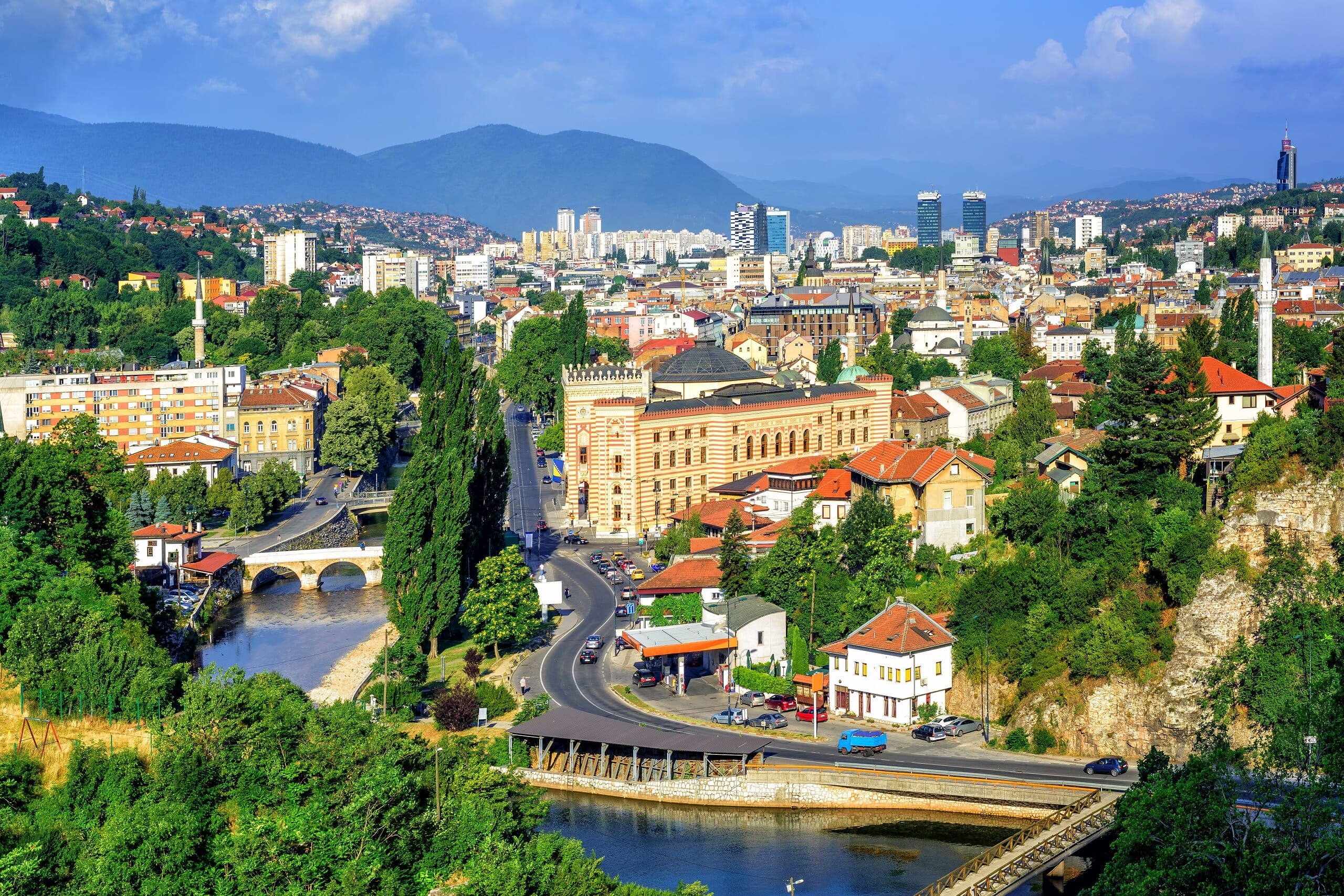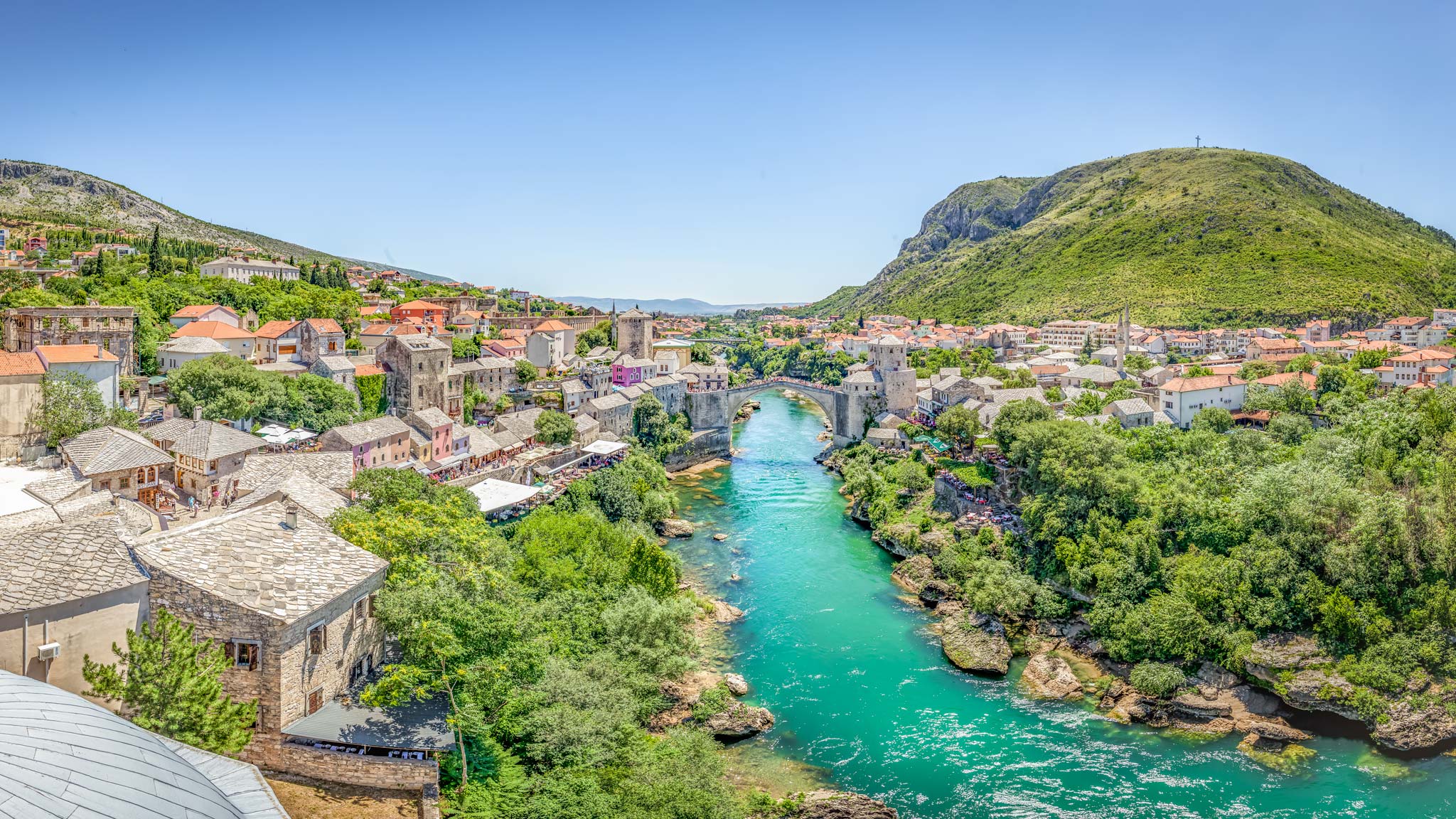Incorporate A Company In Bosnia and Herzegovina In 2025

Bosnia and Herzegovina (BiH), nestled in the heart of the Balkans, is a country known for its stunning landscapes, rich history, and diverse cultural heritage. With Sarajevo as its capital, BiH is bordered by Croatia, Serbia, and Montenegro and has a small coastline on the Adriatic Sea. The nation boasts a complex ethnic makeup, predominantly comprising Bosniaks, Croats, and Serbs, and is characterized by its post-war recovery following the Bosnian War of the 1990s.
BiH operates under a decentralized government structure established by the Dayton Agreement in 1995, featuring two main entities: the Federation of Bosnia and Herzegovina and the Republika Srpska, along with the Brčko District. While its journey toward EU integration is ongoing, BiH has made significant strides in economic and political stability.
Standard of Living in Bosnia and Herzegovina
The standard of living in Bosnia and Herzegovina varies across regions but is generally considered modest compared to Western European nations. With a GDP per capita of approximately $6,000 (as of 2024), the country’s economy relies heavily on industries such as agriculture, manufacturing, and services. The unemployment rate remains high, particularly among the youth, though recent reforms aim to stimulate job creation and foreign investment.
Housing and utilities in BiH are relatively affordable, with costs lower than the European average. Healthcare is a mix of public and private services, but it often faces challenges related to funding and infrastructure. Education, however, is widely accessible, with mandatory schooling up to the age of 15.
Personal Taxes in Bosnia and Herzegovina
Bosnia and Herzegovina employs a relatively straightforward personal income tax system, with a flat tax rate of 10%. This applies to wages, pensions, and other forms of income, although exemptions exist for specific categories, such as social security benefits. Social contributions are an essential part of personal taxes and include payments for health insurance, pension funds, and unemployment benefits. Employers and employees share these contributions, with rates varying by entity. In the Federation of Bosnia and Herzegovina, for instance, combined social contributions can exceed 30% of gross wages, placing a significant financial burden on workers and businesses alike.

Corporate Taxes in Bosnia and Herzegovina
Corporate taxation in BiH is designed to attract foreign investment while maintaining simplicity. The corporate income tax rate is 10%, one of the lowest in Europe, making it an attractive destination for businesses. Entities are taxed based on their income generated within BiH, and tax incentives are offered to companies investing in technology, education, and job creation. Value-added tax (VAT) stands at a standard rate of 17%, applicable to goods and services. However, the taxation system is fragmented, with varying regulations across the two entities and the Brčko District, which can complicate compliance for businesses operating nationwide.
Major Industries in Bosnia and Herzegovina
Bosnia and Herzegovina (BiH), located in the heart of the Balkans, has a diverse economy fueled by its strategic location, natural resources, and skilled workforce. Key industries include manufacturing, agriculture, and tourism.
- Manufacturing and Industrial Sector
BiH has a strong industrial base, with a focus on automotive, metalworking, and textiles. The automotive industry, in particular, has grown significantly, with BiH exporting parts to major European car manufacturers. The metal industry produces aluminum, steel, and other processed goods. Textiles and leather goods are also key export products, often tailored for European markets. - Agriculture and Food Processing
Agriculture remains vital to BiH’s economy, employing a significant portion of the population. The fertile land supports the production of grains, fruits, and vegetables. Livestock farming and dairy production are also notable. Food processing has emerged as a growing sector, with many local brands reaching international markets. - Tourism and Hospitality
Tourism is one of the fastest-growing industries in BiH, driven by the country’s natural beauty and cultural heritage. The capital, Sarajevo, attracts visitors with its historical significance, while cities like Mostar are renowned for landmarks such as the Stari Most (Old Bridge). The untouched landscapes of the Dinaric Alps and rivers provide opportunities for adventure and eco-tourism. - Energy and Mining
BiH has abundant natural resources, including coal, iron, and bauxite. Its rivers provide vast hydropower potential, which the country utilizes to export electricity to neighboring nations. Renewable energy, particularly wind and solar, is a growing sector attracting international investments.
Inflation & Cost of Living in Bosnia and Herzegovina
The inflation rate in BiH has fluctuated in recent years, influenced by global economic trends, import prices, and domestic economic policies. In 2024, inflation was moderate compared to other Balkan countries, but rising costs of energy and imported goods have impacted consumer prices.
The cost of living in BiH is relatively low compared to Western Europe, making it attractive for expats and remote workers. Housing costs are affordable, with average rent in urban areas like Sarajevo ranging from €200 to €400 per month. Utilities, transportation, and food expenses are also inexpensive. However, wages are lower than in most European countries, with the average monthly salary hovering around €500-€600. While this can present challenges for locals, it provides opportunities for expats with higher incomes.
Property Tax, Services, and Sales Tax in Bosnia and Herzegovina
- Property Tax
Property taxes in BiH vary depending on the location, as taxation is managed at the entity level (Federation of Bosnia and Herzegovina, Republika Srpska, and Brčko District). In most regions, property owners are subject to annual taxes based on the assessed value of their property. Rates typically range from 0.05% to 0.5%. - Services and Sales Tax
The Value-Added Tax (VAT) in BiH is set at a standard rate of 17%, applied to most goods and services. Certain essential items, such as basic food products and medicines, may be exempt or taxed at a reduced rate. Businesses must register for VAT if their annual turnover exceeds a specific threshold, ensuring a streamlined tax system.
Types of Business Entities in Bosnia and Herzegovina
BiH offers several business structures for entrepreneurs, each suited to different needs:
- Sole Proprietorship (Obrt)
This is the simplest form of business, ideal for small-scale operations. It is easy to establish, but the owner bears unlimited liability for debts and obligations. - Limited Liability Company (Društvo s Ograničenom Odgovornošću, d.o.o.)
The d.o.o. is the most common business structure in BiH, suitable for small and medium enterprises. It requires a minimum capital of €1,000 and provides limited liability to its owners. - Joint Stock Company (Dioničko Društvo, d.d.)
This structure is designed for larger businesses and requires a higher minimum capital. Shares can be publicly traded, making it suitable for companies planning to attract significant investment. - Branch Office
Foreign companies can establish a branch office in BiH to conduct business without forming a separate legal entity. - General Partnership (Ortačko Društvo)
This involves two or more partners who share liabilities and profits. - Non-Profit Organizations
Non-profit entities can be established for charitable, educational, or cultural purposes and are exempt from certain taxes.

Licenses to Start a Business in Bosnia and Herzegovina
Starting a business in BiH involves obtaining specific licenses and permits, depending on the nature of the enterprise:
- Business Registration
Entrepreneurs must register with the municipal or cantonal authorities and obtain a unique identification number (IDN). - Sector-Specific Licenses
Certain industries, such as healthcare, construction, and food services, require additional permits from relevant government bodies. - Environmental Permits
Businesses impacting the environment, like manufacturing and energy, must obtain environmental clearance. - VAT Registration
Businesses with an annual turnover exceeding the VAT threshold must register with the tax authority. - Employment and Labor Permits
Companies hiring workers must comply with labor regulations and secure appropriate employee permits.
Opportunities for Expats for Business Growth in Bosnia and Herzegovina
Bosnia and Herzegovina offers numerous opportunities for expats seeking to establish or grow businesses:
- Untapped Markets
BiH’s economy is still developing, providing a chance for entrepreneurs to fill gaps in sectors like technology, e-commerce, and renewable energy. - Low Corporate Tax Rates
A corporate income tax rate of 10% makes BiH an attractive destination for foreign investors. - Strategic Location
Situated at the crossroads of Europe, BiH offers easy access to both EU and Balkan markets. - Affordable Workforce
The labor force in BiH is skilled and affordable, especially in engineering, IT, and manufacturing sectors. - Government Incentives
The government provides subsidies and tax breaks for businesses investing in job creation, innovation, and exports.
Citizenship for Expats in Bosnia and Herzegovina
Obtaining citizenship in BiH as an expat is possible but requires meeting specific criteria.
- Residency Requirement
Expats must hold legal residency for a minimum of eight years to apply for citizenship. - Marriage
Foreigners married to BiH citizens can apply for citizenship after three years of marriage and permanent residence. - Investment-Based Citizenship
While BiH does not have a formal investment citizenship program, significant contributions to the economy may facilitate faster approval of residency or citizenship applications. - Naturalisation
Applicants must demonstrate integration into BiH society, including knowledge of the language and culture.

Why Register a Company in Bosnia and Herzegovina
Bosnia and Herzegovina (BiH), strategically located in Southeastern Europe, is an emerging destination for entrepreneurs and investors. There are several compelling reasons to register a company in BiH:
- Strategic Location
Positioned at the crossroads of Europe, BiH offers easy access to European Union (EU) markets and neighbouring Balkan countries, making it an ideal hub for businesses targeting multiple regions. - Low Corporate Tax Rates
The corporate income tax rate in BiH is 10%, one of the lowest in Europe. This tax-friendly environment attracts both local and foreign businesses. - Growing Economy
With its untapped market potential and a developing economy, BiH provides opportunities in diverse sectors, including manufacturing, tourism, IT, and renewable energy. - Skilled Workforce
BiH has a well-educated labor pool, particularly in fields such as engineering, IT, and manufacturing. The cost of labor is relatively low, offering cost-efficiency for businesses. - Government Incentives
The government provides incentives like tax breaks and subsidies to businesses, especially those investing in job creation, innovation, or exports. - Affordable Operating Costs
Compared to Western Europe, BiH offers lower costs for office space, utilities, and business services, ensuring a higher return on investment.
How to Register a Company in Bosnia and Herzegovina
Registering a company in BiH involves several steps, but the process is straightforward for those familiar with the legal requirements.
- Choose a Business Structure
The first step is selecting a suitable legal entity. The most common forms are a Limited Liability Company (d.o.o.), Joint Stock Company (d.d.), and Sole Proprietorship (Obrt). - Reserve a Company Name
Check the availability of the desired company name through the local court registry. The name should be unique and compliant with BiH regulations. - Draft Incorporation Documents
Prepare the necessary documents, including the Articles of Association, identification details of founders, and proof of initial capital deposit. - Register with the Court
Submit the incorporation documents to the local municipal or cantonal court for approval. Once approved, the company is assigned a unique identification number. - Obtain a Tax Identification Number (TIN)
Register the business with the tax authority to obtain a TIN for tax purposes. - Open a Bank Account
Establish a corporate bank account to manage business finances and deposit the required initial capital. - Register for VAT
If the company’s annual turnover exceeds the VAT threshold, it must register with the tax authority for VAT purposes. - Obtain Licenses and Permits
Depending on the business activity, additional sector-specific permits or licenses may be required, such as environmental or construction permits. - Employment and Social Contributions
If the business plans to hire employees, it must comply with labor regulations, including registering for social contributions and insurance.
Cost to Register a Business in Bosnia and Herzegovina
The costs of registering a company in BiH vary depending on the type of entity and specific requirements.
- Initial Capital
For a Limited Liability Company (d.o.o.), the minimum initial capital requirement is 1,000 BAM (Bosnian Convertible Mark), approximately €500. - Court Fees
Court registration fees typically range from 500 BAM to 1,000 BAM (€250-€500), depending on the entity and location. - Notary Fees
Notary services for drafting and certifying incorporation documents cost around 300 BAM (€150) or more. - Licenses and Permits
Sector-specific permits can range from 200 BAM (€100) to 1,000 BAM (€500), depending on the industry. - Tax Registration
Registering for a Tax Identification Number (TIN) and VAT is generally free, but legal assistance for paperwork may incur costs. - Legal Assistance
Hiring legal or consulting services for company registration can cost between 1,000 BAM (€500) and 2,000 BAM (€1,000), depending on complexity.
Relation with Other Countries of Bosnia and Herzegovina
Bosnia and Herzegovina maintains diverse diplomatic and trade relations:
- European Union (EU)
While not an EU member, BiH is a potential candidate country. It has a Stabilization and Association Agreement (SAA) with the EU, promoting trade and investment. - Neighboring Countries
BiH shares strong cultural and economic ties with Croatia, Serbia, and Montenegro. These relationships are crucial for regional trade and collaboration. - United States and Global Relations
BiH enjoys favorable trade agreements with the United States, promoting investment in sectors such as energy, IT, and manufacturing. - China and Middle East
BiH has strengthened ties with China and Middle Eastern countries, benefiting from infrastructure investments and trade partnerships. - Regional Free Trade Agreements
As a member of the Central European Free Trade Agreement (CEFTA), BiH enjoys reduced tariffs and enhanced market access in the region.
Other Taxes in Bosnia and Herzegovina
In addition to corporate income tax and VAT, BiH imposes other taxes:
- Excise Duties
Excise taxes are levied on specific goods such as tobacco, alcohol, and fuel, generating significant revenue for the government. - Social Contributions
Employers and employees share the burden of social security contributions, which fund health insurance, pensions, and unemployment benefits. - Customs Duties
Importers are subject to customs duties, although free trade agreements reduce tariffs for goods from certain regions.
Social Security in Bosnia and Herzegovina
Bosnia and Herzegovina (BiH) offers a comprehensive social security system aimed at safeguarding its citizens’ well-being. Social security includes pensions, healthcare, unemployment benefits, and disability support, funded primarily through mandatory contributions from employees and employers.
The healthcare system operates on a mix of public and private services, providing access to essential medical care. Public healthcare is affordable, but private healthcare is often preferred for shorter wait times and specialised treatments. Pension schemes in BiH cover retirees, offering financial security, although challenges such as an aging population and limited funding strain the system.
Unemployment benefits and disability allowances are available but vary by region, reflecting the decentralized governance system. While these measures provide a safety net, ongoing reforms are necessary to enhance efficiency and inclusivity, particularly for marginalized communities.
Weather, Climate & Regional Safety in Bosnia and Herzegovina
BiH enjoys a diverse climate due to its varied geography. The country has a continental climate in the central and northern regions, characterized by hot summers and cold winters, with temperatures ranging from -10°C in winter to 35°C in summer. In the southern regions, closer to the Adriatic Sea, the Mediterranean climate prevails, offering milder winters and warm, sunny summers.
In terms of safety, BiH is generally peaceful and secure for residents and visitors. While petty crimes like pickpocketing occur in urban areas, violent crimes are rare. The country has been politically stable since the Dayton Agreement ended the Bosnian War in 1995, but ethnic divisions and administrative complexities occasionally spark local tensions. Nevertheless, regional and international cooperation ensures a robust security environment.
Passport Power of Bosnia and Herzegovina
The passport of Bosnia and Herzegovina is moderately strong, offering visa-free or visa-on-arrival access to over 120 countries as of 2024. BiH citizens can travel freely within the Schengen Area for short stays, thanks to agreements with the European Union. The passport also allows access to popular destinations in Asia, the Middle East, and South America.
Scope of Education, Growth, and Lifestyle Opportunities in Bosnia and Herzegovina
- Education
Education in BiH is highly valued, with mandatory schooling until the age of 15. Public schools are widely available, though private and international schools cater to those seeking specialized curricula. The country has several universities, including the University of Sarajevo and the University of Banja Luka, offering diverse academic programs. - Economic Growth
BiH is gradually transforming into a business-friendly environment, offering opportunities in manufacturing, tourism, agriculture, and IT. Foreign investment is encouraged through low corporate taxes and government incentives. The growing tourism sector, driven by the country’s rich cultural heritage and natural beauty, provides opportunities for entrepreneurship and employment. - Quality of Life
Bosnia and Herzegovina offers a balanced lifestyle with a low cost of living compared to Western Europe. Housing, utilities, and transportation are affordable, making it an attractive destination for expats and remote workers. The country’s vibrant culture, rich cuisine, and warm hospitality enhance the quality of life. - Social Growth
Community life in BiH is close-knit, fostering strong social ties. Residents often participate in cultural festivals, religious celebrations, and communal events. Opportunities for outdoor recreation abound, given the country’s picturesque landscapes and national parks.





